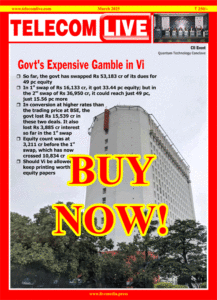Editorial – November 2020
The Supreme Court has ordered Vodafone-Idea and Bharti Airtel to provide complete details to Trai of any segmented / special tariffs that they offered to their customers in the past. In future too, they have to comply. Trai, on its part has to maintain confidentiality. Segmented tariff or special lower tariff was a negotiated, non-transparent customer retention strategy that was adopted by the incumbents to ward off competition.
Reporting requirement is mandated under Trai regulations for ensuring tariff plans are transparent, non-discriminatory and non-predatory. According to Trai, all kind of tariffs must be disclosed on operator websites transparently in subscriber interest. An exception was made in the case of special packages for corporates, SMEs etc. There were no other exceptions. This principle was reiterated in clear terms by Trai in its 63rd Amendment to TTO. Penalties on ground of non-reporting was also stated for operators who defaulted. In the same amendment Trai rationalised the definition of Significant Market Power (SMP) for the purpose of detecting predatory tariffs. An SMP was one with 30 per cent of total activity which in turn was determined on the basis of subscriber base or gross revenue. Superfluous distinctions of kinds of services and calls were dispensed with.
The incumbents challenged the tariff order before TDSAT. In its final order dated December 13, 2018, TDSAT, set aside the Telecom Tariff 63rd Amendment Order in so far as it changes the concepts of SMP, non-predation and the related provisions. It is then that Trai approached the Supreme Court and sought an interim direction to the incumbents (who were the respondents) to disclose information regarding segmented offers.
The whole sequence of the case as well as the developments preceding it, have been narrated in detail in the cover story. The Supreme Court order will open up more facts on incumbent conduct. Trai will have much to analyse.


